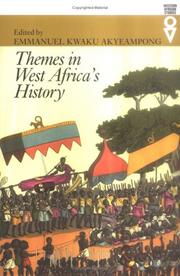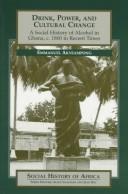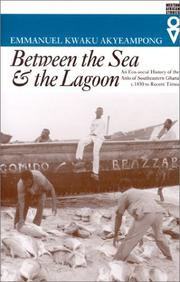| Listing 1 - 10 of 16 | << page >> |
Sort by
|

ISBN: 0821416405 0821416413 0852559968 9780852559963 085255995X 9780852559956 9988626568 9780821416419 9781782049777 Year: 2006 Publisher: Athens, Ohio Ohio University Press
Abstract | Keywords | Export | Availability | Bookmark
 Loading...
Loading...Choose an application
- Reference Manager
- EndNote
- RefWorks (Direct export to RefWorks)
History of Africa --- West Africa --- Africa, West --- History.

ISBN: 043508996X 0435089943 085255673X 0852556233 Year: 1996 Publisher: Portsmouth, NH : Oxford : Heinemann ; James Currey,
Abstract | Keywords | Export | Availability | Bookmark
 Loading...
Loading...Choose an application
- Reference Manager
- EndNote
- RefWorks (Direct export to RefWorks)
Drinking of alcoholic beverages --- Social change --- Consommation d'alcool --- Changement social --- History. --- Social aspects --- Histoire --- Aspect social --- Ghana --- Social conditions. --- Social life and customs --- Conditions sociales --- Moeurs et coutumes --- #SBIB:39A73 --- #SBIB:96G --- Etnografie: Afrika --- Geschiedenis van Afrika --- Change, Social --- Cultural change --- Cultural transformation --- Societal change --- Socio-cultural change --- Alcohol consumption --- Alcohol drinking --- Alcohol use --- Alcoholic beverage consumption --- Consumption of alcoholic beverages --- Drinking problem --- Liquor problem --- Social drinking --- History --- Social history --- Social evolution --- Alcoholic beverages --- Alcoholism --- Temperance --- Social aspects.
Book
ISBN: 1782049770 Year: 2006 Publisher: Oxford, England : James Currey,
Abstract | Keywords | Export | Availability | Bookmark
 Loading...
Loading...Choose an application
- Reference Manager
- EndNote
- RefWorks (Direct export to RefWorks)
There has long been a need for a new textbook on West Africa's history. In Themes in West Africa's History, editor Emmanuel Kwaku Akyeampong and his contributors meet this need, examining key themes in West Africa's prehistory to the present through the lenses of their different disciplines.
Book
ISBN: 1139990373 1139985752 1139644599 1107041155 1107691206 Year: 2014 Publisher: Cambridge : Cambridge University Press,
Abstract | Keywords | Export | Availability | Bookmark
 Loading...
Loading...Choose an application
- Reference Manager
- EndNote
- RefWorks (Direct export to RefWorks)
This edited volume addresses the root causes of Africa's persistent poverty through an investigation of its longue durée history. It interrogates the African past through disease and demography, institutions and governance, African economies and the impact of the export slave trade, colonialism, Africa in the world economy, and culture's influence on accumulation and investment. Several of the chapters take a comparative perspective, placing Africa's developments aside other global patterns. The readership for this book spans from the informed lay reader with an interest in Africa, academics and undergraduate and graduate students, policy makers, and those in the development world.
Economic development --- Development, Economic --- Economic growth --- Growth, Economic --- Economic policy --- Economics --- Statics and dynamics (Social sciences) --- Development economics --- Resource curse --- History. --- Africa --- Eastern Hemisphere --- Economic conditions --- Politics and government. --- Economic conditions.
Book
Year: 2012 Publisher: Washington, D.C., The World Bank,
Abstract | Keywords | Export | Availability | Bookmark
 Loading...
Loading...Choose an application
- Reference Manager
- EndNote
- RefWorks (Direct export to RefWorks)
Bringing together history and economics, this paper presents a historical and processual understanding of women's economic marginalization in Sub-Saharan Africa from the pre-colonial period to the end of colonial rule. It is not that women have not been economically active or productive; it is rather that they have often not been able to claim the proceeds of their labor or have it formally accounted for. The paper focuses on the pre-colonial and colonial periods and outlines three major arguments. First, it discusses the historical processes through which the labor of women was increasingly appropriated even in kinship structures in pre-colonial Africa, utilizing the concepts of "rights in persons" and "wealth in people." Reviewing the processes of production and reproduction, it explains why most slaves in pre-colonial Africa were women and discusses how slavery and slave trade intensified the exploitation of women. Second, it analyzes how the cultivation of cash crops and European missionary constructions of the individual, marriage, and family from the early decades of the 19th century sequestered female labor and made it invisible in the realm of domestic production. Third, it discusses how colonial policies from the late 19th century reinforced the "capture" of female labor and the codification of patriarchy through the nature and operation of the colonial economy and the instrumentality of customary law. The sequel to this paper focuses on the post-colonial period. It examines the continuing relevance and impact of the historical processes this paper discusses on post-colonial economies, and suggests some policy implications.
Anthropology --- Colonial economy --- Gender --- Gender and Development --- Gender and Law --- Gender production --- Macroeconomics and Economic Growth --- Population Policies --- Poverty Reduction --- Resources extraction --- Rural Development Knowledge & Information Systems --- Wealth in people
Book
Year: 2013 Publisher: Washington, D.C., The World Bank,
Abstract | Keywords | Export | Availability | Bookmark
 Loading...
Loading...Choose an application
- Reference Manager
- EndNote
- RefWorks (Direct export to RefWorks)
This paper draws on history, anthropology, and economics to examine the dynamics and extent of women's contribution to growth and economic development in post-colonial Africa. The paper investigates the paradox of increased female enrollment in education and the persistence of gender discrimination in labor force participation; it also considers the overwhelming importance of the informal economy in female economic activity. The first axis the paper studies is whether reducing educational gender gaps enhances growth in per capita gross domestic product and reduces female fertility rates and infant mortality. The question is, why would some African countries resist this pattern? The second axis examines agriculture and home production. Women's economic activities in the informal economy largely represent the commercialization of domestic skills and dependence on social networks. The shunting of female production to the informal sector in the male-dominated colonial economy is easy to understand, but why has the informal economy persisted where female production is concerned well beyond the colonial period? The paper attempts to explain these trajectories by using country case studies on Senegal, Botswana, and Kenya. Although women's contribution to growth and economic development seems to be positive and significant in predominantly Christian and mineral-rich economies, it is more constrained in pronounced Muslim dominated countries and agrarian economies. At the same time, impressive uniform growth in informal sector production in recent years suggests that occupational job segregation and gender inequality remain strong across the region, despite the apparent loosening of traditional norms and cultural beliefs, most notably illustrated by the reduction in educational gender gaps and increased female labor force participation rates.
Achieving Shared Growth --- Gender --- Gender & Poverty --- Gender and Development --- Gender and Law --- Informal economy --- Macroeconomics and Economic Growth --- Population Policies --- Post-colonial Africa --- Poverty Reduction --- Primary Education --- Religion

ISBN: 0821414089 0821414097 Year: 2001 Publisher: Athens Ohio university press
Abstract | Keywords | Export | Availability | Bookmark
 Loading...
Loading...Choose an application
- Reference Manager
- EndNote
- RefWorks (Direct export to RefWorks)
Anlo (African people) --- Beach erosion --- Coastal ecology --- Human ecology --- Economic conditions --- Fishing --- Social conditions --- Keta Region (Ghana) --- Environmental conditions.
Book
Year: 2012 Publisher: Washington, D.C., The World Bank,
Abstract | Keywords | Export | Availability | Bookmark
 Loading...
Loading...Choose an application
- Reference Manager
- EndNote
- RefWorks (Direct export to RefWorks)
Bringing together history and economics, this paper presents a historical and processual understanding of women's economic marginalization in Sub-Saharan Africa from the pre-colonial period to the end of colonial rule. It is not that women have not been economically active or productive; it is rather that they have often not been able to claim the proceeds of their labor or have it formally accounted for. The paper focuses on the pre-colonial and colonial periods and outlines three major arguments. First, it discusses the historical processes through which the labor of women was increasingly appropriated even in kinship structures in pre-colonial Africa, utilizing the concepts of "rights in persons" and "wealth in people." Reviewing the processes of production and reproduction, it explains why most slaves in pre-colonial Africa were women and discusses how slavery and slave trade intensified the exploitation of women. Second, it analyzes how the cultivation of cash crops and European missionary constructions of the individual, marriage, and family from the early decades of the 19th century sequestered female labor and made it invisible in the realm of domestic production. Third, it discusses how colonial policies from the late 19th century reinforced the "capture" of female labor and the codification of patriarchy through the nature and operation of the colonial economy and the instrumentality of customary law. The sequel to this paper focuses on the post-colonial period. It examines the continuing relevance and impact of the historical processes this paper discusses on post-colonial economies, and suggests some policy implications.
Anthropology --- Colonial economy --- Gender --- Gender and Development --- Gender and Law --- Gender production --- Macroeconomics and Economic Growth --- Population Policies --- Poverty Reduction --- Resources extraction --- Rural Development Knowledge & Information Systems --- Wealth in people

ISBN: 9780821445662 0821445669 0821416405 9780821416402 0821416413 9780821416419 9988626568 9789988626563 0852559968 9780852559963 085255995X 9780852559956 9781782049777 1782049770 Year: 2006 Publisher: Oxford, England : James Currey,
Abstract | Keywords | Export | Availability | Bookmark
 Loading...
Loading...Choose an application
- Reference Manager
- EndNote
- RefWorks (Direct export to RefWorks)
There has long been a need for a new textbook on West Africa's history. In Themes in West Africa's History, editor Emmanuel Kwaku Akyeampong and his contributors meet this need, examining key themes in West Africa's prehistory to the present through the lenses of their different disciplines.
Digital
ISBN: 9780253066664 Year: 2023 Publisher: Bloomington, Ind. Indiana University Press
Abstract | Keywords | Export | Availability | Bookmark
 Loading...
Loading...Choose an application
- Reference Manager
- EndNote
- RefWorks (Direct export to RefWorks)
| Listing 1 - 10 of 16 | << page >> |
Sort by
|

 Search
Search Feedback
Feedback About UniCat
About UniCat  Help
Help News
News